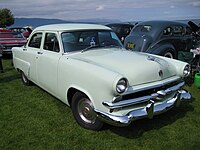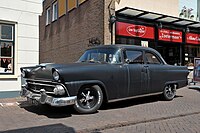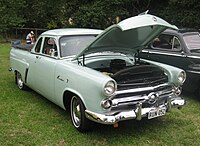
Plymouth Belvedere is a series of American automobile models made by Plymouth from 1954 until 1970.

The Chevrolet Delray, named after the Delray neighborhood of Detroit, Michigan, debuted in 1954 as an optional trim level on two-door models of Chevrolet's mid-range 210 series of cars. In 1958, it became a distinct series of its own at the bottom of Chevrolet's lineup, and added a four-door sedan, and sedan delivery, but it only remained in production for that model year.

The Plymouth Plaza is an automobile which was produced by Plymouth from 1954 through the 1958 model year.

The Ford Custom is an automobile which was produced by Ford in the United States, Canada and Australia in certain years from 1949 to 1981.

The Pontiac Chieftain is an automobile which was produced by Pontiac from 1949 to 1958. The 1949 Chieftain and Streamliner models were the first all new car designs to come from Pontiac in the post World War II years. Previous cars had been 1942 models with minor revisions.

The Ford Country Sedan is a full-size station wagon that was built by Ford in the United States from 1952 until 1974. It was part of the U.S. Ford full-size car line available in each year.

The Ford Customline is an automobile model that was sold between 1952 and 1956 by Ford in North America.

The Ford car was thoroughly updated in 1941, in preparation for a time of unpredictability surrounding World War II. The 1941 design would continue in an aborted 1942 model year and would be restarted in 1946 and produced until 1948 when the more modern 1949 Fords were ready. During the initial year of this car, it evolved considerably. The front fenders came in three pieces, the theory being that small damages could be replaced easily. During the year, it evolved into two pieces with the lower front and back sections being joined. The hood risers changed, the early ones being the same as 1940 Fords, changing during the year to the better later version. The 1941 Convertible had no rear side windows, the only side windows being in the doors; in 1942, quarter windows were added so the rear occupants could see out.

The Ford line of cars was again refreshed for 1952, although remaining similar to the all-new 1949 Fords. This time, curved one-piece windshield glass joined a new "Mileage Maker" straight-6 engine with 101 hp. The 226 CID (3.7 L) L-head straight-6 was replaced by an overhead valve 215 CID (3.5 L) Mileage Maker with 101 hp (75 kW), while the old 239 CID (3.9 L) Flathead V8 remained with 110 hp (82 kW). This design would continue through the 1954 model year, with an updated design offered in 1955.

The 1955 Ford is an automobile which was produced by Ford in the United States for the 1955 model year and, in revised form, for the 1956 model year. A new design would be offered in 1957.
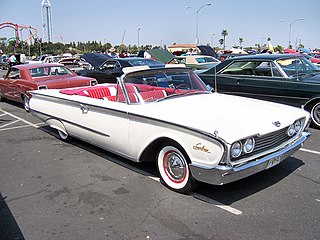
Leading into the 1950s, Ford, along with many other top of the market car manufacturers were capitalizing on the post war boom. Many new advancements in technology and products were being developed during this time that allowed for cars going into the future to have features never seen before or features that were not normal until now. The automatic window, for example, was a new feature that made Americans see their current cars as outdated and technologically behind. The 1960s were one of the best eras for the production of cars, as the war between Ford and Chevrolet heated up and produced some of the most classic and recognizable cars in America still to this day.

The Ford Crestline is an automobile which was produced by Ford in the United States for models years 1952 to 1954.

The Ford Falcon (XM) is a mid-size car that was produced by Ford Australia between February 1964 and February 1965. It was the third iteration of the first generation of the Ford Falcon.

The Plymouth Cranbrook is an automobile which was built by Plymouth for the model years 1951 through 1953. It replaced the Special Deluxe when Plymouth changed its naming scheme and was essentially the same as the Plymouth Concord and Cambridge. In period TV commercials, the cars were all introduced as "the new Plymouth" then followed by the model year, and made no mention of the nameplate, which was used to describe the trim package, standard and optional features that were included. The Cranbrook model name was however featured in contemporary sales brochures.

The Ford Ranch Wagon is a station wagon which was built by Ford in the United States from 1952 to 1974. The Ranch Wagon was a full-size model, except in 1963 and 1964, when it was part of the intermediate-size Fairlane series, and represented the lowest-priced selection in its respective line.

The Holden HX is a range of automobiles which was produced by Holden in Australia from 1976 to 1977.

The Holden HR is an automobile that was produced by Holden in Australia from 1966 to 1968.

The Chevrolet Stylemaster is an automobile produced by Chevrolet in the United States for the 1946, 1947 and 1948 model years.

A coupé utility is a vehicle with a passenger compartment at the front and an integrated cargo tray at the rear, with the front of the cargo bed doubling as the rear of the passenger compartment.
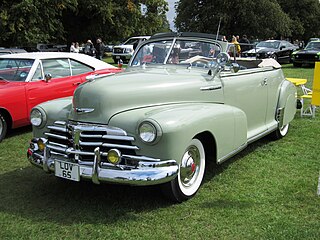
The Chevrolet Fleetmaster is an automobile which was produced by Chevrolet in the United States for the 1946, 1947 and 1948 model years. The Fleetmaster series included the Fleetline sub-series which was offered only in 2-door and 4-door "fastback" bodystyles.


